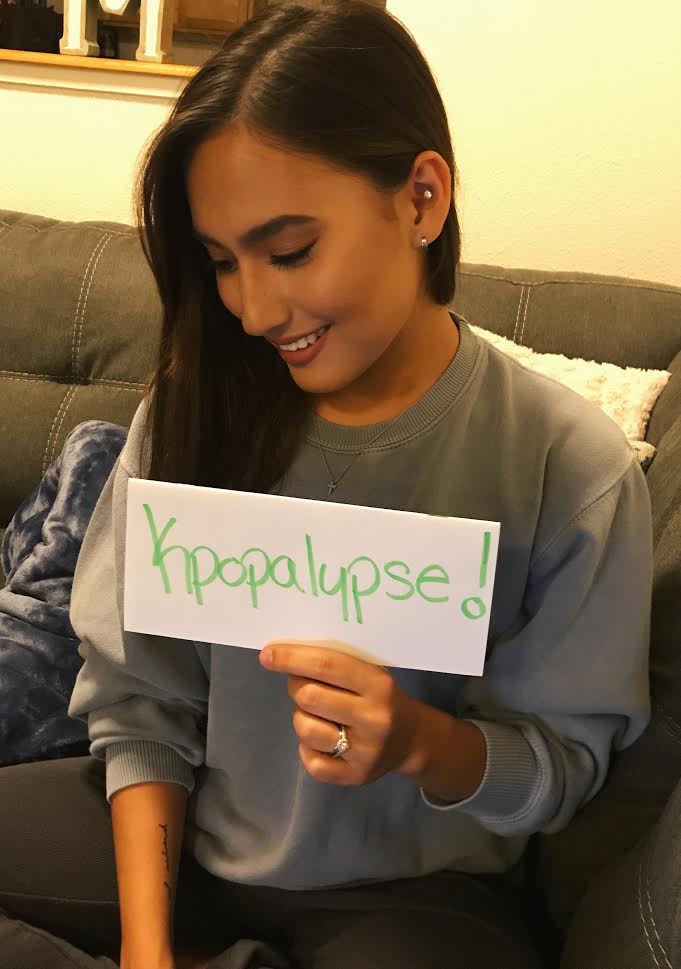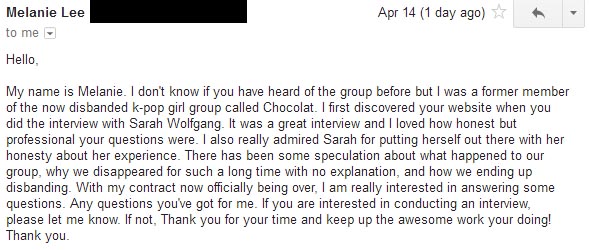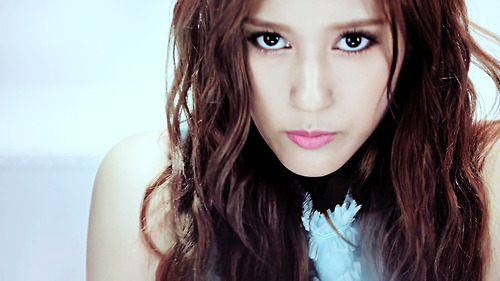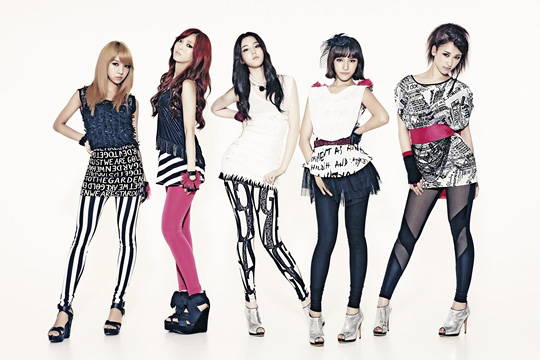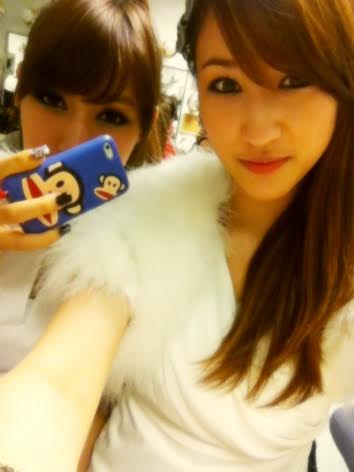Most K-pop performers don’t want to do an interview with Kpopalypse, and given the pressures on them to keep up a squeaky-clean image, who can blame them? My interview series goes deep — as deep as my interview subjects are willing to go, and certainly far deeper than the K-pop industry as a whole is comfortable with. Which was why I was surprised when I received this:
Naturally I was keen to talk to Melanie Lee, formerly of ChoColat, who was particularly brave and had a lot to say. All of it is below, with almost no editing. Read on and be informed!
Hi, how are you?
Good!
ChoColat has disbanded, is that correct?
Yes, we did.
When did that actually happen? I know that “Black Tinkerbell” was the last song ChoColat came out with, and there was a long period of nothing. I’m not sure what happened after that.
Our contract officially ended in February 2017. The entire time until now everyone was just kind of laying low, doing our own thing, waiting until the contract was over, but because of the contract, we were legally bound and not able to say anything. We weren’t able to make statements, which is why everyone was like “What are you guys doing, why aren’t you saying anything?” and we were like “I really wish I could but I can’t!”
We’ll get back to the group ending later, but for now I want to talk a bit about how you got involved in the group in the first place.
It all started in middle school, I was in seventh grade, I was going to a school on a military base in South Korea, that’s where I met the other former member named Tia. Our mums somehow knew each other, from a long time ago they were friends, obviously when she moved they reconnected again and then we met up. I found out that she was an MC for a kids TV show teaching English, and I guess she got in contact with our former company and our former boss. He was trying to start a biracial group, something new, something nobody had seen before, a group made up of all biracial girls. Because she was living in an area where being biracial was so common — on a military installation, military active duty members meet new people all the time — it was really common where we were at the time, so she was just looking around for anybody interested. As her mum and my mum were friends, she asked me and I was like [puts on ‘young Melanie’ voice], “Yeah, of course! I wanna be famous, let’s do it!” Who would pass up on the chance? I guess some people would, but I was like “of course, I’m down, let’s do it” and that’s just kind of how it all got started.
I know when ChoColat debuted the “mixed race” thing was a really big part of the hype. I was wondering if that was accidental or if it was planned.
It was completely planned. That was our former company boss’ first intent; he wanted everybody to be half-American, half-Korean, half-Chinese, half-Japanese, he didn’t really care, he just wanted an all-biracial group, something that’s never been done before, that would cause a lot of hype, as you said. In the end it didn’t turn out as all-biracial, but that was how he wanted it to turn out to be.
So you basically fell into it because of family, it wasn’t a considered thought or a situation where you had a lifelong dream. The opportunity came up, and you thought “this sounds cool” so you went for it.
Right. I was always into singing, I liked singing and dancing but never considered it as a career. At one point in every girl’s life she probably thinks “yeah I’d love to do that”, but I never actually thought that I would be able to do it, so when the opportunity came, I was like “hell yeah, let’s do it”.
I know you read the interview I did with Sarah Wolfgang where she talked quite extensively about the training period. Sarah never debuted, unlike yourself, but did what she said about training match with what you experienced during training?
Yes and no. I do believe that some things are blown way out of proportion just like she said, for example there were only a few times where I actually got no sleep. For me, it started off pretty easy, and then the more I got into it, the more they started really tying us down and making it tough. In the beginning it was maybe four hours a day every other day, and once my seventh grade year ended and it was summer break it was eight hours every day and you only get Sundays off. Then once it became two or three months before we debuted we all moved in together into a little house in Seoul, and that’s when we were literally practicing from 7 AM to 8 PM every single day, no breaks, they took away our phones, no Internet. We had a female manager who lived in with us, obviously she controlled everything we did, whatever we ate, when we showered.
At what point did you have to sign contracts?
We signed contracts very early on, way before we started training, almost immediately after I met our former boss he made us sign contracts, which I guess was very smart of him, because he wanted to tie us down.
Was there anything in that contract which prepared you for what happened later? Like having a live-in manager controlling every aspect of what you do?
I guess something similar was in the contract stating that we would abide by the company’s rules, that we’re basically their products, whatever they want us to do we can’t say no. Not necessarily like “you will have a manager” or all that stuff.
But it is generally in there that you’re their property, essentially?
Right, it was generalised. Honestly, at the time I was twelve, all of us were underage. Me, Tia, and Juliane were all underage, so the people looking over the contract were our parents. I don’t remember if they had lawyers look over it and stuff, honestly I was really naive and stupid when I look back on it now, I had no idea what was in the contract at the time, but I signed it!
Which song was ChoColat’s debut song?
“Syndrome“.
How were you received when this came out, and what the experience like of debuting in a group?
The experience was a one of a kind experience, something I’ll never be able to experience again, and something not many people get to experience. It was exciting but it was also really scary and also really draining. It was not what I expected it to be at all, and it was not what people told me it was going to be, or how my company explained that it was going to be before we joined. How everybody made it sound like it was going to be, it was nothing like that at all.
What did they say it was going to be like, and what was it actually like? What were the main points of difference?
Basically we were given empty promises: “You guys are gonna debut, this is gonna be a biracial girl group, you guys are gonna be amazing, so famous, you guys are gonna make it, it’s going to be revolutionary, you guys are just gonna train, you guys can do this, it’s gonna be so easy.” Obviously he told us “it’s not gonna be all fun and games, you guys are gonna have a hard time at a certain point” and we were like “yeah, of course, no problem!” Maybe it was just me being so young and naive, but once it was actually time to debut, there was just so much criticism, there was so much disappointment, there was so much anger during that time. So many people were angry at us for not being the way that they wanted us to be, or for not being prepared enough. It was just completely different from what I expected.
You mean managers being angry at you?
Yeah, managers being angry at us, our company being angry at us, our choreography teachers being angry at us … nobody ever told us we were good enough. Essentially they were trying to make sure that we did better, but I just felt so much negative energy during that time, which sucked, because we were debuting.
Did things get easier as you went on after debut or harder?
It didn’t necessarily get harder, but it was a reality check. Once I debuted, I realised “wow, this is not what I expected it to be, people are not what I expected they were, this is not what I signed up for”, that is what I thought.
Did you or anyone else in the group ever actually make any money?
I believe at one point I made $12, but that’s all I made!
How did you make your $12?
I hosted this show called “The O Show” on this channel called Olleh TV, I made $12 through that! I have no idea what I did with that $12…
I was going to ask what you bought yourself…
I have no idea, I don’t remember! [Laughs]
You mentioned negative energy and not feeling that good about the experience once it got rolling. How about the others in the group, was everyone in much the same boat?
I think everybody had their own set of views towards it. I think me personally may have seen it worse than others. I was such a free soul before that, and I just felt so tied down with so many people criticising me and telling me what not to do, and what I shouldn’t do and what I should do, and I was just so overwhelmed by everything. I was younger than the others too, I may have seen it a little worse, but I think the other girls definitely had something that they wanted to say but obviously we weren’t permitted to talk about it or anything.
What do you think held the group back from being more successful?
Definitely the company.
How so?
I read in Sarah’s interview that she mentioned this too — no matter how talented this individual is, it’s really the company that backs them up, and the company that has the power. It’s really, really true, because no matter how much we practised and no matter how much we interacted with our fans, tried to put up a good front, tried to have a good reputation, if it’s not our company getting us gigs or pushing for us, or talking to all these other producers about us, there’s really only so far we can go unless for whatever reason we became viral, which obviously never happened.
With company decisions, do you have any insight into how the chain of decision-making actually works?
Every decision was just made by the boss (the CEO). He had moments where he came up to us — when he was trying to choose our debut song, he was like “which song do you like better, which one do you think is a hit?” and we were all like “this one” or “that one” and he was like “no no no, you guys are all wrong, I’m a go with this other one“. There were a lot of those kind of situations where it was like “well if you weren’t going to listen to me anyway, why ask?” but naive little me was like [puts on ‘young Melanie’ voice] “I think this one is the better one, we need to do this one!” It was all the boss, no matter what anybody said. I think the only people he took input from were other producers, but the ultimate decision was in his hands every single time.
How much contact would you normally have with the CEO?
If we were practicing certain choreography, our manager would take a video of it, send it to our CEO, then he would look at it, then he would say his concerns to the manager and then our manager would deliver that message to us. I think the only time we were actually able to have contact with him ourselves was … actually never … we were able to get in contact with him, but I don’t think he really wanted to.
When you were in the group while it was active, how aware were you of fan comments and reactions?
I was really aware, very aware. I was the type of person where what people thought really mattered to me, it really affected me, and I was hurt from it really easily, or my spirits were lifted really easily because of it. I don’t know why I continued reading it even though every time I read it out I’d cry or whatever, but it was addicting, I wanted to know what people thought about me, though half the time they were not good.
Do you think it ultimately made you a happier or a sadder person?
In the end, as of me today, I’m very happy with where I am, the person I’ve become, the things I believe in, the things I want to teach my children one day, the advice I’d give them. In the end it worked out well, but there was a period where I really thought “I’m having a mid-life crisis even though I’m only 14, oh my god, somebody save me!”
In terms of interacting with fans yourself, you mentioned that you’re under a lot of control. What sort of control is placed on your interactions with fans?
We had a lot of foreign fans, fans who don’t speak Korean. Our company wanted us to tweet a lot, in English, or in whatever other language we could speak, to gain more of a variety of an audience. If we wanted to upload pictures, they would always be spying on their own social media. If they didn’t like a picture, they would tell us to take it down right away, or if there was a certain picture of us that they thought was pretty that they liked, they said “you should upload this right now and say this” or they’d be like “hey you guys are going on this TV show today, don’t you think you should upload a status saying you’re going to be on there”, stuff like that.
So you’re micromanaged fairly heavily in terms of social media?
Right, but there were like tons of times where I’d uploaded a picture of me with no makeup on and my manager was like “You need to take that down right now! I don’t know what you were thinking!” and I was like “Okay, I’m sorry! I guess I’m ugly!”
What were the most unusual rules about your behaviour that they had, that you didn’t expect going into it?
“Act more Korean.”
Okay. What does that mean, exactly?
One of the things that I found — I can’t speak for the other girls, but just me, personally — especially in the beginning experience, was that I was “too American” or “too foreign” or whatever you want to say. They said “you’re not acting like a Korean, you’re too Americanised”. The way I spoke, I wasn’t respectful enough, I wasn’t quiet enough, even my appearance, they were like “you look too American”. So when we were going to debut, the reason why they chopped my hair the way it was, my hairstyle in “Syndrome” was partly an effort to make me look younger, but also to make me look more Asian with the bangs and the short hair. That was just so ridiculous to me, because I was in my prime age of trying to figure out who I am. Now that I’m thinking about it, that age is when I’m supposed to figure out who I am and venture out into different things, and there I was with people yelling in my face, telling me to not be who I am. It’s a part of me, I’m half-Korean but I’m also half of many other things, and they’re telling me “you have to be this certain thing or people aren’t going to like you, you have to be the ideal Korean type that they like” and I’m like “well what’s the point of having a biracial Korean girl group if you’re just going to want me to be like just one type of person? I don’t get it!” That was the most difficult.
They liked the idea of a biracial group, but they didn’t like the idea of what that meant culturally, perhaps.
Right, exactly. Most of what we were criticised about from choreographers or managers or stylists was our appearance, mainly. We were half-American, they were saying “because you are half-American you are more prone to get fat, because you are half-American you need to stay pale so you don’t get darker”, just stuff that makes no sense, you know? That was just so ridiculous to me, I just didn’t understand.
What was your typical diet in a day?
Oh wow. Um … let’s see.So, until we started living together the very first time with a female manager, I didn’t have a diet, I just ate whatever I wanted, because I was a twelve year old, why would I control my diet? But after we moved in with everybody that’s when our manager started controlling what we ate. I’m sure before that the other girls were watching their diet but I just didn’t really care until we moved in. We would mainly just eat boiled chicken breasts, maybe sometimes we would have some salad dressing on it. At other times if our manager or someone didn’t have time to provide something like that for us, we would go to the convenience store and they would get us a small nutrition bar, and we would have maybe two or three of those per day, maybe a banana, that would be it. Sometimes if we were lucky they would let us go and get a bowl of salad from this little bread store called Paris Baguette. That was it. Me, I was fortunate that I was the smallest in the group, in height and weight, they weren’t as tough on me as they were on the other girls, but that’s basically what it was like for a very long time.
With training, what was the ratio of things such as singing training to dancing training to gym, etc? How much were you trained in different things?
When we were training we started off with singing lessons, because I was still in school they couldn’t pull me out every single day. They started off with singing lessons and that was about one to three times per week, I can’t remember exactly how often, it was so long ago. Then we started doing dance lessons three times per week, Mondays Wednesdays and Fridays after school we would drive up there and I think the remaining days when we didn’t have dance lessons we would do singing lessons. Eventually we just stopped singing lessons completely, our CEO was like “just practice on your own, but you need to practice dancing” so we were like “okay whatever”, so we started to do strictly just dancing. That was pretty much it. For gym, they never sent us to a gym, all they really told us was, “Don’t eat! Don’t eat! Don’t get fat! Don’t get fat! Please!” I was like, “O-kay!”
How do you feel about ChoColat’s songs? Do you still listen to them?
[Laughs] I do actually, sometimes. For me, when friends and family ask me about it, it’s kind of like a bad yearbook picture — it’s always there but you really don’t want to look at it because it’s really ugly, or funny or something, that’s how I feel about it. I’m happy that it happened, and I like some of the songs, I think my favourite song is “Black Tinkerbell”. My only thing about not having anything to say about the songs is that we didn’t pick any of them. We weren’t given a say in any of them, so I don’t really have any attachment towards any of them.So not only are you not writing them, you’re not getting to choose anything about them.
Right, exactly. I think we were the most involved in “Black Tinkerbell”, for whatever reason, I don’t know why. We met up frequently with the songwriter to talk about the song, and the meaning of the song, which is why I think it’s my favourite song. The rest of the songs I don’t feel any sort of attachment.
So what was the extent of that involvement? What can you take responsibility for?
Singing — my voice! What I mean by involvement was not “lets do this, let’s do that” but it’s more like we were actually given the chance to talk to the person who wrote the song, and talk about the melodies and talk about the meaning of the lyrics and the way he wanted us to sing. It was more in-depth than every other song we’ve recorded, every other song it was more like, “Hey, listen to it. Do you like it? Well, it’s gonna be your song!” And then we would go record it and whoever we were recording it with would say “I want you to make it sound like this” and it would be done. With “Black Tinkerbell” we were actually having a conversation about the song, and he was helping us understand the song, which is why I liked it.
So what broke the group up, or why did you stop doing stuff after “Black Tinkerbell”?
[Laughs] So direct!Pick whichever version of that question applies!
Okay, so what broke the group up…
Or made you inactive, rather.
In my opinion — and I’m just going say this is my opinion so other people aren’t like “that’s not what went on” … in my opinion it was a long time coming. I mean a really long time coming, I wanna say maybe since the beginning of the group, I saw it coming, just because of the way that we were treated, not just by the company, but by the whole industry. Me personally, I was just so overwhelmed and shocked, I grew to almost hate the industry because of the way that it was making me feel, the things that it was telling me to do. Living with four other girls, three other girls in the end, you butt heads too, we’re not going to all get along, eventually people have different views about things, especially with us and the company. There was a lot of stuff that we didn’t agree on, but we were kinda forced to do. The company did give us a lot of leniency in certain ways, but for the most part it was “you do this, if I tell you to do this, you have to do this” and I guess for a lot of other K-pop stars and trainees it’s easy for them to abide by that, but for me, for whatever reason, I just couldn’t handle it, it was just too much for me.
In what ways were they the most lenient?
I guess because of the fact that we were all so young. With diet, there were certain times when we were like “can we please, please, please eat this?” they would be like “okay, you can eat this”. If we weren’t feeling good and didn’t want to go to practice they were like “okay, I’ll push practice back a couple of hours”, just stuff like that which is actually kind of crazy in the training process because you’re supposed to be 100% dedicated, and if you’re sick you still come out. So I guess in those ways they were a little bit lenient, I don’t even know if that makes sense.
What was the other side, what were the things that they were strict on that you didn’t want to do? Was it just things like diet?
No. I guess it all came to how we were treated that made me not want to do the things that they were asking me to do. Just the feeling of being objectified and them seeing me as a product — which essentially I am, I signed up for it — but just how they were treating us, it was just too much for me. The whole mentality of “if I tell you to do this, you have to do this, you can’t say no” and the fact that we were expected to feel lucky to have to do these things because “so many other people would kill to be in your position”, which it true, but … I think in the whole K-pop process and industry the biggest mentality is “you are lucky to be working with me, you are lucky to be at the point you are, so many people would kill for this, you cannot complain, you cannot have complaints because I’m helping you become a star”. I guess I was at that age where I was also going through puberty, and I was really rebellious and I couldn’t agree with that.
In between “Black Tinkerbell” and disbanding, what has everyone been doing with themselves? What do you do when you’re having a multi-year hiatus and you’re in a K-pop group?
Actually, I don’t keep in contact with a lot of the girls. I only keep in contact with one girl, who is Juliane. That’s not because of any particular reason, it’s just me and Juliane just really bonded over the few years and happened to keep in contact. I know the other girls are doing their own thing, I think Tia’s going to online schooling right now or something, I saw a tweet that she posted. I honestly have no idea what Soa is doing, I haven’t talked to her in years.
So what are you doing with yourself at the moment?
I’ve moved to the States, I’m no longer in Korea. I’m married, and I am starting to go to school online and that’s all I’ve been up to!
What are you studying?
I don’t have a major yet, I’m just trying to get my General Studies Associate degree right now, because I really have no idea what I want to do with my life, but I’m assuming it’ll come to me when the time is right.
Any last things that you want to say that I haven’t touched on? If you were going to advise someone who was just about to do what you just did, if you wanted to give them some advice, what would it be?
I’m just going to say exactly what Sarah said — don’t do it! But if you are going to do it, please please, believe me when I say it’s nothing like how you think it’s going to be. It’s not all the glamour, it’s not just fun and games, you have to be mentally prepared. Especially I know there’s a lot of foreigners who want to become K-pop stars, I see a lot of foreigners going on the ‘K-Pop Star‘ singing show, and when there’s that cultural difference, which was the hardest part for me — you grow up a certain way, but you’re trying to make it in a different culture where you have to do things differently and be different — it’s really hard because you have to learn to adapt and you may not want to adapt, or you may try, but you might just be like me and you might just be like “fuck you”. In the end, to everyone asking, no I don’t think I’ll ever go back into K-pop. Yes, I know Tia is still trying to be in K-pop, I support her, she can do her thing, I think she’ll be great if she does get out there, and … I’m alive! I’m not dead! I see a lot of people saying, “Is she even alive?”
Thank you very much for doing the interview!
Thank you so much, you’re doing me a huge favour, lifting a weight off my shoulders!
I’m glad it’s working out for you. The reason why i do this is to raise awareness of this type of thing, there’s so many people out there in the K-pop world who are delusional about what going through that process means, and the expectations of the people involved…
Tell me about it.
Part of my mission is to cut through all of that and to show “it’s not really like what you think it is”, so having you talk to me about this is really valuable. When I say it myself, people don’t necessarily believe it…
Is it possible for me to add another part to the interview?
Yeah, if you’d like to say some more.
When you said “people don’t see what it’s really like”, I just remembered. The stuff about mental health issues, do you think that would be something that would be valuable to the interview, or … ?
Oh yes. Very much so.
To shorten a long-ass story, from the beginning, since my training, it really wore down on me mentally, because people were telling me not to be who I am, and trying to tell me to be another thing. The whole “be more Korean, don’t be American, you have to lose weight, you can’t be fat” and all that stuff really really got to me, and the constant, constant negativity and the people criticising me all the time. It makes you believe that you’re nothing. It made me believe “I’m never good enough”, I was 99 pounds (43.9kg) at 5’3″ (161.5cm) at one point and people were still telling me that I looked too fat, and I was constantly saying to myself, “Oh my gosh, am I ever going to be skinny?” This eventually led to serious mental health issues, I got depression, I was self-harming and I was going to therapy. During the duration of “Black Tinkerbell”, for that entire time I was going to therapy. Every Wednesday at 9 AM I was going to a therapy counselor’s office right across the street from where I lived, and that’s just something that I really wanted to share with people. That’s how much it affected me, all that negativity and judgement. I know a lot of people handle it differently, but for me, the way I was at that age, it really really got to me, and it broke my parents’ hearts when they found out I was self-harming. It broke my group members’ hearts. My company didn’t really care, they knew about it, the manager saw the scars, but was just like “don’t do that anymore” and that was kind of the end of it. It’s just really real, the things that people go through in this industry, it’s really real, it’s really hard on you. Not everybody goes through the same things, but I went through a really shitty experience although it turned out okay in the end. It was a really bad time for me at a certain point. It was an amazing experience — but [for those wanting to go down this path] really know what you’re getting into, really be mentally prepared, you have to have a thick skin, and I just didn’t have a thick skin, I really let it get to me, and I hate that I let everything get to me as much as it did, but it happened, and that’s really what made me into the person that I am today.
I’ll make sure I include this!
Thank you!
—–
That’s all for this interview!
Are you someone who is or was active in the Korean pop industry and would like to be featured here? If so, get in touch!
 Asian Junkie Asian pop. Without discretion.
Asian Junkie Asian pop. Without discretion.
